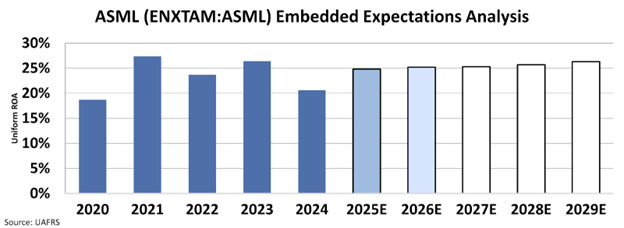This company is selling the finest shovels amid the AI rush

The semiconductor market is a rapidly growing, trillion-dollar industry driven by the increasing importance of chips in all electronics.
ASML (ENXTAM:ASML) holds a monopoly on the most advanced chip-making technology, known as EUV lithography, which is essential for producing the powerful chips needed for Artificial Intelligence.
As the AI market expands, demand for ASML’s unique, high-margin machines is expected to increase significantly, positioning the company for substantial future growth and profitability.
Investor Essentials Daily:
Wednesday News-based update
Powered by Valens Research
The infiltration of semiconductors into almost everything electronic today, from smartphones to cars, appliances, and TVs, has created a $545 billion market.
This market is expected to reach $1 trillion by 2030 as chips continue to become more important in all things electronic.
Semiconductor manufacturing is a highly complex and precise process, especially the photolithography stage.
Using light, photolithography machines etch intricate patterns thousands of times smaller than a grain of sand that act as blueprints into chips.
Photolithography is crucial in determining how many transistors can be added to a semiconductor, making it more powerful.
By using shorter light wavelengths, photolithography machines can create more intricate patterns, allowing more transistors to be placed on a single chip.
And ASML (ENXTAM:ASML) manufactures the most advanced machines used to make the most advanced semiconductors on the market today.
ASML specializes in two of the most advanced forms of lithography: Deep ultraviolet (“DUV”) and extreme ultraviolet (“EUV”).
DUV is applicable for a wide range of chips, from less-advanced home appliances to more technologically-advanced memory chips.
While there are some competitors in the DUV space, ASML is the clear market leader, accounting for 92% of the industry’s added production capacity over the past five years.
The company’s DUV machines produce wavelengths of light around 193 nanometers. While this seems small, it’s nothing compared with the latest innovation in lithography.
EUV machines work by replicating a phenomenon that occurs naturally in stars. They can produce wavelengths of just 13.5 nanometers.
That’s a staggering 14 times shorter than the next-best technology. These machines are needed to produce the most advanced chips powering today’s leading AI tools.
ASML is the only company that produces ASML machines, making it essential for the burgeoning AI market.
Servers, data centers, and storage spaces are expected to grow 18% through 2030. AI is boosting most of that demand.
EUV chips are used for advanced concepts like specialty memory and logic. They currently make up around a third of the semiconductor market, and are expected to see the most growth in the coming years.
EUV spending on advanced logic is projected to grow between 10% and 20% in the next five years. Also, EUV spending for dynamic random-access memory (“DRAM”) is expected to grow between 15% and 25%.
In addition to driving growth, the EUV space is also more profitable for ASML. Prior to the initiation of EUV machines, ASML generated margins around 18%.
Their introduction immediately improved operating margins to 28% in 2010, and they have continued to improve to 32% in 2024.
ASML is the only EUV manufacturer in the world, giving it pricing power over its competitors. As demand for these machines continues to rise, ASML’s bottom line will also grow.
Some investors fear that companies might not need the most advanced chips and the most advanced machines to develop cutting-edge AI programs, which will lead to customers purchasing cheaper, lower-margin machines.
We can see what the market thinks through our Embedded Expectations Analysis (“EEA”) framework.
The EEA starts by looking at a company’s current stock price. From there, we can calculate what the market expects from the company’s future cash flows. We then compare that with our own cash-flow projections.
In short, it tells us how well a company has to perform in the future to be worth what the market is paying for it today.
At the current stock price, the market predicts that ASML’s Uniform return on assets ”ROA” will remain flat at around 25% levels.
Market pessimists worry that models becoming more efficient will lead to a wave of declining demand for chips if companies find cheaper ways to develop AI programs.
However, economist William Jevons’ findings, known as the Jevons paradox, argue against this possibility.
Jevons first discovered the phenomenon when coal-burning factories became more efficient in 1860s England. Since people needed less coal to generate power, they expected demand for coal to decline.
Instead, the opposite occurred. Demand for coal continued to rise, and plants produced more power than ever before, driving the Industrial Revolution.
Technological advancements that make more efficient use of resources don’t actually hurt the demand for that resource.
As companies discover more efficient ways to create AI models, they’ll make more models than anyone ever thought possible.
That will require more chips and more machines produced by ASML. The company believes revenue can more than double from $30 billion in 2024 to as much as $63 billion by 2030.
ASML is an industry leader with unmatched products that are vital for driving the industries that will shape our world in the next decade.
Given the fact that EUV machines are higher margin products than DUVs, and demand for advanced equipment will grow as more and more companies look to implement AI into their operations, ASML’s returns should continue their ascent.
As this company continues to expand its profitability, equity upside will be warranted.
Best regards,
Joel Litman & Rob Spivey
Chief Investment Officer &
Director of Research
at Valens Research





